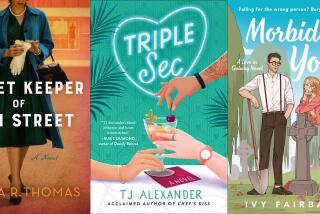His Pal Bubba to the Rescue...
In Dennis Lehane’s novels, when the going gets rough for protagonist and narrator Patrick Kenzie, the Boston private eye calls for his boyhood pal Bubba. The big bruiser with the tiny conscience is the latest addition to a growing trend in detective fiction--the use of a sociopathic stooge to keep the hero honorable.
As far as I can tell, the trend began 20 years ago when, in Robert B. Parker’s “Promised Land,” the self-righteous sleuth Spenser first encountered the existentialist hit man Hawk--the start of a beautiful friendship that is still thrilling readers. Since then, Lawrence Block’s Matt Scudder novels have introduced a Hell’s Kitchen butcher boy, Mick Ballou, who takes some of the moral weight from Scudder’s shoulders. Robert Crais’ law-abiding Elvis Cole continues to rely on his more lethally resourceful partner, Joe Pike. In James Lee Burke’s Louisiana crime tales, painfully noble policeman Dave Robicheaux is assisted by amoral ex-policeman Clete Purcell. And when Walter Mosley’s Easy Rawlins is in need of strong-arm support, he looks no further than his pal, the savage killer Mouse.
Unlike Hawk, Mouse, Joe Pike and the rest, each of whom has had his moments of charm or humor or even--gasp--nobility, Bubba is irredeemably evil: a racist, sexist, homophobic lunatic who kills with a grin. His buddy Kenzie describes him as “6 feet, 4 inches, 235 pounds of raw adrenaline and disassociated anger.” Lehane’s refusal to adhere to the likable psychopath stereotype is, I think, symptomatic of his approach to writing crime fiction. He wants to make it real. And, as may be surmised by his titles, “A Drink Before the War” and the new one, Darkness, Take My Hand, he also wants to make it poetic. Realism and poetry don’t always mesh.
They coexist more comfortably in the new novel than in the overpraised “Drink.” The latter was lumbered with too much exposition, too much meditation, too much violence and maybe a bit too much about the Boston Irish. “Darkness,” with its gory serial murders, certainly doesn’t stint on the violence. It’s more Irish than Molly Malone’s on St. Pat’s Day. And Kenzie is still one of the most self-reflective of fictional sleuths. But this time, the story is strong enough to accommodate the excesses. “Drink” seemed to be using its plot, a mix of power politics and warring African American gangs, as an excuse for Kenzie to meditate on his past life and present prejudices. “Darkness” sends its hero on a gut-wrenching chase to stop an ultra-clever maniac intent on brutally murdering those near and dear to him. No wonder he seeks Bubba’s help.
At the start of the novel, Kenzie gives us a tantalizing preview of what we’re in for, “a nightmare that left me with wounds the doctors say have healed as well as can be expected, even though my right hand has yet to regain most of its feeling, and the scars on my face sometimes burn under the beard I’ve grown. . . . The office--Kenzie/Gennaro Investigations--is closed, gathering dust I assume. . . . Angie’s been gone since the end of November, and I try not to think about her. Or Grace Cole. Or Grace’s daughter, Mae. Or anything at all.”
Angie Gennaro is his partner; a woman he’s loved since childhood who married his best friend. Grace is the woman he was hoping to marry. What happened to them? To him? It’s a promising beginning, and this time the promise is fulfilled.
When Sir William S. Gilbert waxed lyrical about the unhappiness of the policeman’s lot, he might have had Skip Langdon in mind, disregarding such little matters as gender and era. Skip, since her debut in Julie Smith’s 1990 Edgar-winning novel, “New Orleans Mourning,” has not had an easy time of it on the New Orleans police force. The nearly 6-foot-tall, slightly ungainly offspring of a socially prominent family, she is viewed with suspicion by her fellow cops and with disapprobation by her mom and dad. But the fact is, Skip has an affinity for the job, and after solving five entertainingly documented murder cases, she has begun to gain some respect from her peers and even from her parents.
All that goes by the wayside in The Kindness of Strangers. Unlike her previous Langdon novels, which mixed New Orleans events (Mardi Gras, Jazz Fest, etc.) with social phenomena (12-step programs, computer bulletin boards), Smith has crafted a breathless thriller in which an emotionally depressed Skip engages in a personal battle with a dangerous psychopath who is seen by the rest of the city as a liberal minister of God and the ideal man for the job of mayor. Errol Jacomine, a fascinating character based on the late cult leader Jim Jones, whom Smith investigated as a reporter for the San Francisco Chronicle, dispatches his minions to neutralize Langdon. When that doesn’t work, the serious threats begin. And the battle moves to Cajun country, where a hurricane ups the ante in the game of life and death. Without sacrificing the eccentric but believable characters, the moody deep South exoticism and the careful plotting that have popularized her recent work, Smith this time pushes her protagonist to the breaking point and the series to a new high water mark of suspense.
Reading a novel by Joe Gores (“Hammett,” “32 Cadillacs”) is like watching a clever magician. You’re led from event to event, confident that this time you will not be fooled. But the magic always catches you offguard. In Gores’ new tale of the repo men and skip tracers of the San Francisco-based Daniel Kearney Agency, Contract Null & Void, Gores is more generous with his plots than usual. There are several murders prompted by a new hotel workers union contract and a second, unrelated assassination attempt on an obnoxious nerd who’s been offered a different type of contract involving a very special computer chip. In addition, we’re told of Kearney’s marital problem, agency operative Larry Ballard’s difficult romance with a union official and field man Patrick O’Bannon’s booze blackouts. Even the woman who cleans the agency’s offices at night has her own plot strand. You read along, being entertained by the humor and intrigued by the complications but still wondering what the heck the author has in mind with all these seeming digressions. Then, suddenly, the end of the book draws nigh and, almost without warning, it all comes together. All loose ends are tucked, neatly, naturally and satisfyingly. Gores has pulled off another of his splendid hat tricks.
Judith Van Gieson’s Hotshots marks the seventh case for Albuquerque lawyer Neil Hamel, and it’s one that requires all of her professional savvy as well as her ability for self-preservation. Jonie Barker was one of a group of hotshots (wild-land firefighters) who died trying to squelch a wilderness blaze that threatened expensive homes in the area. Her parents ask Neil to find out if they have cause to sue the Forest Service for negligence. In poking around the ashes of the earlier disaster, Neil, an unsentimental, thorough investigator as well as a lawyer, meets an assortment of credible characters who offer her conflicting stories about the fire. And she experiences several life-threatening challenges, including a flash fire, that are a bit too up close and personal.
Van Gieson’s prose is clean and refreshingly straightforward, and she has succeeded in making both her protagonist-narrator and the New Mexican locales memorable. One thing more: She gives the reader pause to wonder if it’s worth sacrificing the lives of firefighters to protect homes knowingly constructed in hazardous areas.
More to Read
Sign up for our Book Club newsletter
Get the latest news, events and more from the Los Angeles Times Book Club, and help us get L.A. reading and talking.
You may occasionally receive promotional content from the Los Angeles Times.





